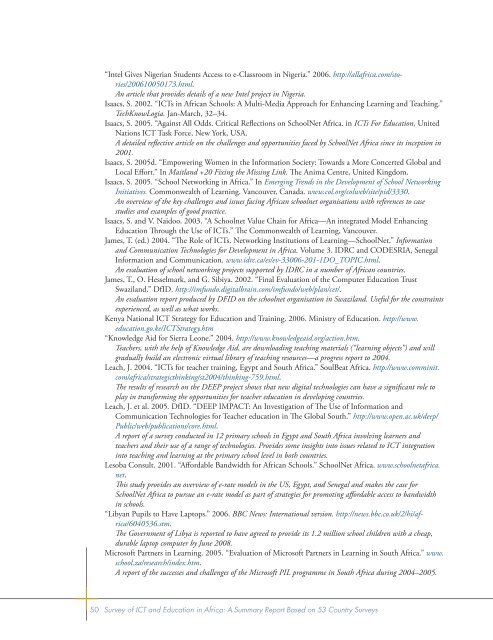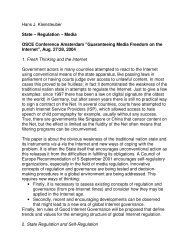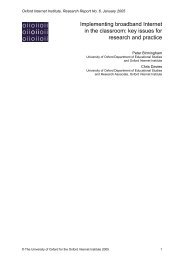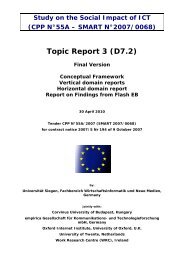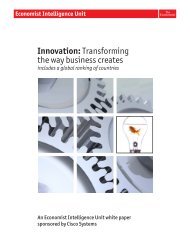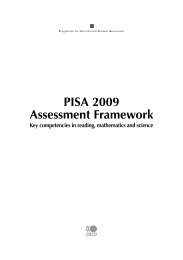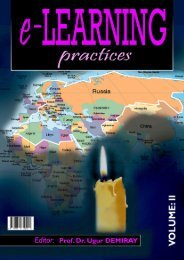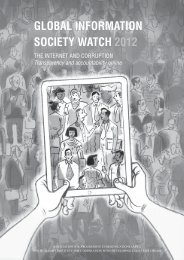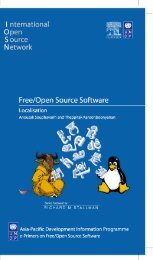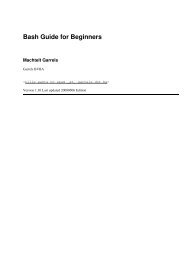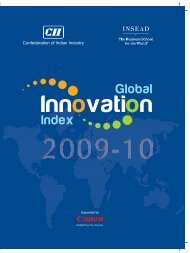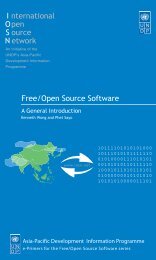A pilot project to develop effective <strong>ICT</strong> supported distance education delivery models and methodologies forsecondary schools in Namibia. This collaborative venture between UNESCO and the Namibian College forOpen Learning was initiated in January 2005.“E-Learning: Promoting Distance Education at the Secondary Level.” 2005. UNESCO. http://portal.unesco.org/en/ev.phpURL_ID=28751&URL_DO=DO_TOPIC&URL_SECTION=201.html.The pilot project to develop effective <strong>ICT</strong>-supported distance education delivery models and methodologies forsecondary schools in Namibia is a collaborative venture between UNESCO and the Namibian College forOpen Learning.“Engendering <strong>ICT</strong> Toolkit.” 2002. World Bank. http://siteresources.worldbank.org/EXT<strong>ICT</strong>TOOLKIT/Images/Engendering_<strong>ICT</strong>_Toolkit.gif.A description of the toolkit and a case study of its application in Ugandan schools.Fouldes, S. 2002, Internet-based Teacher Development—Virtual Communities of Practice, School ofEducation, University of Witwatersrand, Johannesburg, South Africa. www.school.za/edn/research.htm.This report is based on an analysis of the Educator Development Network model of teacher development bySchoolNet South Africa.Gadio, C.M. 2001. “Exploring the Gender Impacts of World Links in some selected African countries: AQualitative Approach.” World Links, Washington, USA. http://www.mulonga.net/discus/messages/26/387.html?1019926542.A summary of the findings of an independent study conducted in four African countries.“Global Teenager Project (GTP).” 2005. iConnect Online. http://www.iconnect-online.org/Articles/iconnectarticles.2005-05.An assessment report of the implementation of this project in three schools in Zambia.“Going Forward in Ghana.” 2006. Global e-Schools and Communities Initiative(GeSCI). www.gesci.org/gesci/publisher/index.jsp?aID=229&nID=111&pID=107.GeSCI has signed a memorandum of understanding with the Government of Ghana to expand the deploymentof <strong>ICT</strong>s in schools in Ghana and to promote the effective use of these <strong>ICT</strong>s to achieve Ghana’s educational andcommunity development objectives.Hesselmark, O. and J. Miller. 2002. “A Country <strong>ICT</strong> Study for Namibia.” Swedish InternationalDevelopment Cooperation Agency (Sida). http://www.eldis.org/cf/search/disp/docdisplay.cfm?doc=DOC17782&resource=1This report covers the fifth in a series of country <strong>ICT</strong> surveys commissioned by Sida as part of its ongoingprogramme to support the use of <strong>ICT</strong> in developing countries.Howie, S.J., A.Muller, and A. Paterson. “<strong>ICT</strong> Development in Schools, An Evaluation of South Africa.”2005. Human Sciences Research Council (HSRC), South Africa / Nexus. http://www.eldis.org/cf/search/disp/docdisplay.cfm?doc=DOC18476&resource=f1.This study evaluates the use of <strong>ICT</strong> in South Africa, such as current infrastructure, connectivity, curriculum,and timetable allocations, and to a lesser extent classroom practice of <strong>ICT</strong> in South Africa.Howie, S.J., A. Muller, and A. Paterson. 2005. Information and Communication Technologies in South AfricanSecondary Schools.” South Africa Human Sciences research Council. http://www.hsrcpress.ac.za/full_title_info.asp?id=1984.This book is based on the results of research undertaken in the Second Information Technology in EducationStudy (SITES), an international cross-sectional survey evaluating the status of <strong>ICT</strong> in relation to instructionalactivities across 26 countries.“Imfundo Programme in Ghana.” 2002. Department for International Development (DfID). http://www.dfid.gov.uk/research/imfundo-ghana.asp.An Imfundo project to assist Ghana’s Special Education Division with advice on best practice for <strong>ICT</strong> forspecial education needs in Africa.“Imfundo Research Programme.” 2002–2004. DfID. http://www.dfid.gov.uk/research/imfundo.asp.Imfundo was an initiative of DfID which considered ways in which <strong>ICT</strong> could be used to support educationin Ethiopia, Ghana, Kenya, and South Africa.www.infodev.org ANNEX 2: A Selected Bibliography of <strong>ICT</strong> in Education in Africa 49
“Intel Gives Nigerian Students Access to e-Classroom in Nigeria.” 2006. http://allafrica.com/stories/200610050173.html.An article that provides details of a new Intel project in Nigeria.Isaacs, S. 2002. “<strong>ICT</strong>s in African Schools: A Multi-Media Approach for Enhancing Learning and Teaching.”TechKnowLogia. Jan-March, 32–34.Isaacs, S. 2005. “Against All Odds. Critical Reflections on SchoolNet Africa. in <strong>ICT</strong>s For Education, UnitedNations <strong>ICT</strong> Task Force, New York, USA.A detailed reflective article on the challenges and opportunities faced by SchoolNet Africa since its inception in2001.Isaacs, S. 2005d. “Empowering Women in the Information Society: Towards a More Concerted Global andLocal Effort.” In Maitland +20 Fixing the Missing Link. The Anima Centre, United Kingdom.Isaacs, S. 2005. “School Networking in Africa.” In Emerging Trends in the Development of School NetworkingInitiatives. Commonwealth of Learning. Vancouver, Canada. www.col.org/colweb/site/pid/3330.An overview of the key challenges and issues facing African schoolnet organisations with references to casestudies and examples of good practice.Isaacs, S. and V. Naidoo. 2003. “A Schoolnet Value Chain for Africa—An integrated Model EnhancingEducation Through the Use of <strong>ICT</strong>s.” The Commonwealth of Learning, Vancouver.James, T. (ed.) 2004. “The Role of <strong>ICT</strong>s. Networking Institutions of Learning—SchoolNet.” Informationand Communication Technologies for Development in Africa. Volume 3. IDRC and CODESRIA, SenegalInformation and Communication. www.idrc.ca/es/ev-33006-201-1DO_TOPIC.html.An evaluation of school networking projects supported by IDRC in a number of African countries.James, T., O. Hesselmark, and G. Sibiya. 2002. “Final Evaluation of the Computer Education TrustSwaziland.” DfID. http://imfundo.digitalbrain.com/imfundo/web/plan/cet/.An evaluation report produced by DFID on the schoolnet organisation in Swaziland. Useful for the constraintsexperienced, as well as what works.Kenya National <strong>ICT</strong> Strategy for Education and Training. 2006. Ministry of Education. http://www.education.go.ke/<strong>ICT</strong>Strategy.htm“Knowledge Aid for Sierra Leone.” 2004. http://www.knowledgeaid.org/action.htm.Teachers, with the help of Knowledge Aid, are downloading teaching materials (“learning objects”) and willgradually build an electronic virtual library of teaching resources—a progress report to 2004.Leach, J. 2004. “<strong>ICT</strong>s for teacher training, Egypt and South Africa.” SoulBeat Africa. http://www.comminit.com/africa/strategicthinking/st2004/thinking-759.html.The results of research on the DEEP project shows that new digital technologies can have a significant role toplay in transforming the opportunities for teacher education in developing countries.Leach, J. et al. 2005. DfID. “DEEP IMPACT: An Investigation of The Use of Information andCommunication Technologies for Teacher education in The Global South.” http://www.open.ac.uk/deep/Public/web/publications/core.html.A report of a survey conducted in 12 primary schools in Egypt and South Africa involving learners andteachers and their use of a range of technologies. Provides some insights into issues related to <strong>ICT</strong> integrationinto teaching and learning at the primary school level in both countries.Lesoba Consult. 2001. “Affordable Bandwidth for African Schools.” SchoolNet Africa. www.schoolnetafrica.net.This study provides an overview of e-rate models in the US, Egypt, and Senegal and makes the case forSchoolNet Africa to pursue an e-rate model as part of strategies for promoting affordable access to bandwidthin schools.“Libyan Pupils to Have Laptops.” 2006. BBC News: International version. http://news.bbc.co.uk/2/hi/africa/6040536.stm.The Government of Libya is reported to have agreed to provide its 1.2 million school children with a cheap,durable laptop computer by June 2008.Microsoft Partners in Learning. 2005. “Evaluation of Microsoft Partners in Learning in South Africa.” www.school.za/research/index.htm.A report of the successes and challenges of the Microsoft PIL programme in South Africa during 2004–2005.50Survey of <strong>ICT</strong> and Education in Africa: A Summary Report Based on 53 Country Surveys
- Page 1:
+ MAINSTREAMING ICT and Education S
- Page 5 and 6:
Infrastructure in Schools 11Infrast
- Page 7 and 8:
larger, on-going, systematic, coord
- Page 10 and 11:
Project BackgroundOverviewThis repo
- Page 12: Mary Mmayi, Philip Ouma Ayoo; Dlang
- Page 16 and 17: DANTE (Delivery of Advanced Network
- Page 21 and 22: nnnnand South Africa, have mechanis
- Page 23 and 24: countries. In addition, a very limi
- Page 25 and 26: nMauritius uses a fleet of “cyber
- Page 27 and 28: nnnnnnInstitutional policy developm
- Page 30 and 31: ICT Activities and Initiativesin Pr
- Page 32 and 33: nnnnnnsourced second-hand and refur
- Page 34 and 35: use of ICTs in teaching and learnin
- Page 36 and 37: ICT Activities and Initiativesin No
- Page 38 and 39: Gender Equity and ICTin EducationGe
- Page 40 and 41: Factors Enabling andCONSTRAINING IC
- Page 42 and 43: ICT in Education inAFRICA: A Way Fo
- Page 44 and 45: Notes1. Steiner, R., T. Nyaska, M.
- Page 46 and 47: ANNEXESwww.infodev.org Notes 33
- Page 48 and 49: ANNEX 1:Regional ICT in EducationIn
- Page 50 and 51: prises in Africa and the developing
- Page 52 and 53: LinuxChix Africa | www.africalinuxc
- Page 54: Headquartered in the US, the WCE so
- Page 57 and 58: This book chronicles and analyses t
- Page 59 and 60: “Mozambique ICT4D National Policy
- Page 61: 3. Primary and Secondary EducationA
- Page 65 and 66: 4. Tertiary Education“AAU Newslet
- Page 67 and 68: www.aau.org/wghe/publications/wghe_
- Page 69 and 70: An EDC pilot project to build the c
- Page 71: COUNTRIES/AFRICAEXT/EXTAFRREGTOPEDU
- Page 74: SURVEY OF ICT AND EDUCATION IN AFRI


